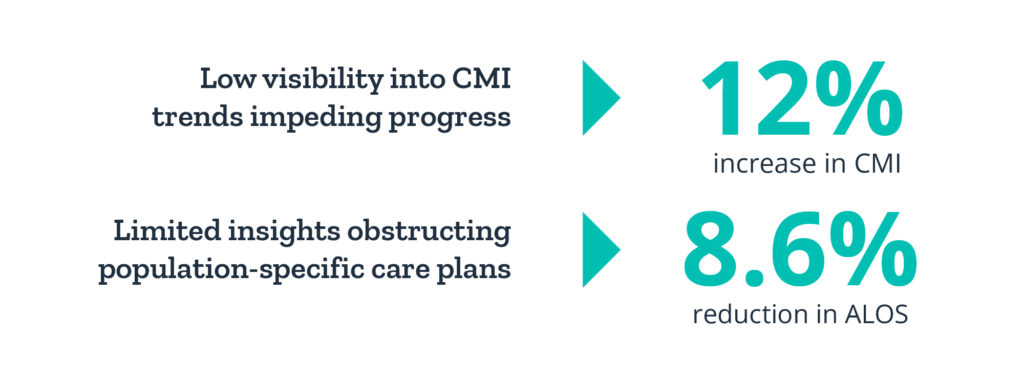Our MedeAnalytics team recently had the exciting opportunity to sit down with leaders from Ardent Health Services on a Becker’s Hospital Review hosted webinar. During the webinar, Ardent—a 30-hospital system headquartered in Nashville, TN—discussed their analytics improvement journey and shared the major impact that this process had on critical metrics and outcomes. Read on to get a full recap—and learn how to take the next steps on your path to analytics-powered success.
Starting with the end in mind
“We knew we had to get somewhere fast,” said Trevor Snow, VP of HIM at Ardent Health Services, at the start of the webinar. Ardent was struggling with:
- Mismatched, disorderly reporting across facilities
- Limited ability to generate service line-specific insights from data
- Low visibility into important trends (e.g., CMI, MCC/CCC capture)
- Inadequate resourcing to provide c-suite with meaningful dashboards
Ardent leadership set inspiring goals for tackling these challenges, including:
- Unite departments and decision-makers around the need for transformation
- Don’t be traditional and stick with basic information sharing
- Start taking data-driven action and following through
- Establish an analytics framework that can scale with its growth and expansion
Ardent knew having a great partner would not only make their goals easier to achieve but would also ensure that they were achieved in a sustainable, affordable and efficient way.
Raising the bar
Creating system-wide change is no easy feat. Ardent’s secret? Adrienne Younger, AVP of Clinical Documentation Integrity at the organization, shared, “We always strive to get to that next level. We’re constantly looking for opportunities. We aim to be best in class; we want to raise the bar. To do that, we’ve figured out how to really tap into MedeAnalytics based on where we are as an organization and where we want to go next.”
Here are just two examples of how Ardent turned obstacles into accomplishments:

This is the point where the audience asks, “but… how?” Changes that significant must be backed up by a thoughtful, strategic approach—and Ardent’s story is no exception.
Analytics as a team sport
One of the reasons Ardent was able to be so successful is that they approached analytics as a team sport. From CDI to coding to C-suite, every team had a position to play and a role to fulfill. As all the great teams do, Ardent recruited the best. With growing internal engagement and strong external support—in the form of MedeAnalytics—Ardent was able to deploy the following strategies:
- Use rapid, accurate reporting and robust drill-down capabilities to concretely identify the cause of trends and variances, determine where the opportunity for improvement lies, and funnel resources to the CDI program appropriately
- Restructure CDI programs based on service line-specific analytics so staff would strategically review patients according to volume and impact on CMI, CC/MCC capture
- Investigate differences in trends per hospital to deliver a tailored resourcing and prioritization approach for each facility
- Capitalize on reporting and dashboard functionalities to provide clear, valuable education (e.g., PEPPER reports) to the c-suite, driving increased support, trust and action
- Embed analytics into workflows to tap into outside-the-box approaches to achieve goals (e.g., expand scope of CDI teams to impact ALOS)
- Apply prioritization tools to identify DRGs requiring follow up and benefit patients in-house
- Execute retro audits to review volume, forecast for upcoming months, and predict staffing needs accordingly
- Share reliable data and insights with physicians to drive meaningful changes in documentation practices
- Report specifically on COVID-19 patient population trends and outcomes to prepare staff and clinicians more effectively
- Level up COVID-19 data into thorough—yet simple—dashboards to help inform executive decision-making
Top five takeaways
In reflection, Snow and Younger shared a handful of lessons learned from Ardent’s analytics journey that they hope will help other organizations along similar paths:
- Detailed, readily available data insights are key to establishing trust—and a dedicated, collaborative analytics partner is invaluable
- A goal-oriented strategy is imperative to unifying stakeholders and achieving success
- Set continuous objectives, move toward them steadily, and never stop reaching for the next level
- Adjust to changes along the way, but don’t let them distract you from your consistent end goals
- Track the value you provide to showcase wins, inspire staff, and demonstrate ROI to leadership
Only scratching the surface
Though we aimed to make this post as comprehensive as possible, there is only so much we can fit into several hundred words—and this summary only scratches the surface of all the incredible insights and strategies that Ardent Health Services shared in the webinar. To learn more about Ardent’s journey, hear audience Q&A, and get invigorated about analytics, watch the full playback:
Get our take on industry trends
Why It’s Time for Healthcare to Move Toward AI Reporting
Business intelligence (BI) was a dramatic and significant step forward in healthcare industry reporting and a natural transition to artificial intelligence (AI) enabled real-time insights.
Read on...Why Healthcare Should “Double-Down” on Exploring AI-powered BI for Reporting
Many areas in healthcare rely not only on the collection of data but, importantly, the ability to decipher and act upon it. In that intersection, reporting was born.
Read on...Why Health Plans and Employers Need Stop Loss Reporting
Due to rising healthcare costs and the Affordable Care Act removing the ban on capitated benefits coverage, numerous employers with self-insured health plans often purchase stop loss coverage. This coverage is not medical insurance; but rather, it’s a financial and risk management tool that protects the employer from excessive claims.
Read on...Bridge the Payer/Provider Data Gap
Every patient has a plethora of data associated with their health record, which can include decades of enrollments, claims, accounts and charges. Much of this data is not housed within the same institutional, facility or provider database…
Read on...


